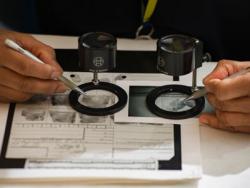
ATF’s fingerprint specialists conduct forensic examinations of fingerprints collected from crime scenes and analyze them to help generate leads for criminal cases. They serve as ATF’s subject matter experts and technical advisors in matters relating to the proper collection, preservation, packaging, and submission of criminal evidence. They also conduct research to improve forensic analyses, scientific methods, and criminal identification procedures.
In the Field
Fingerprint specialists work out of ATF’s three forensic laboratories. They are strategically placed across the nation so they can rapidly deploy to emerging incidents and provide support. They collect crime scene evidence and identify potential leads that support major field investigations. They assist ATF special agents during the execution of search warrants to ensure the proper handling and documenting of evidence.
In the Lab
Back in the lab, fingerprint specialists can identify possible fingerprints, palm prints and footprints on a wide range of items and materials, from firearms and related components to explosive and incendiary devices, glass, plastics and synthetic materials.
Once the prints are developed, specialists can compare them to known fingerprint record cards or search local, state and federal automated fingerprint systems to generate leads that match possible suspects.
In the Classroom
ATF’s fingerprint specialists teach the Advanced Arson and Explosives for Agents course at the National Center for Explosives Training and Research and educate new agents on their expertise at the Federal Law Enforcement Training Center. They train agents on the collection, packaging and preservation of evidence as well as conduct practical exercises.
Interagency Partnerships

Fingerprint specialists also train local law enforcement laboratories on the print development process and teach classes at the U.S. Fire Administration on print development at arson crime scenes. In addition, they share their extensive knowledge with various committees that write standards for the forensic field, such as the AAFS Standards Board for friction ridge discipline and the Organization of Scientific Area Committees for Fingerprints and Pattern Evidence.
Specialized Training and Education
Fingerprint specialists at ATF focus on developing prints from items that may have possible links to suspects involved in arson, explosives and firearms-related cases. Applicants must have an undergraduate degree with a science concentration in forensics, physical or biological sciences or have 8-10 years of specialized experience in the field of fingerprints. Once hired, applicants with no prior experience go through a two-year program that includes on-the-job training with senior fingerprints specialists and formal classes to learn how to identify, photograph, develop and classify prints.
Both newly trained and experienced fingerprint specialists are evaluated before they work on their first ATF case. In addition, they must pass a certification test by the International Association for Identification and recertify every five years.


